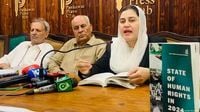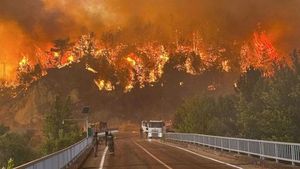In recent weeks, Balochistan has become a focal point of escalating tensions between peaceful activists demanding justice and the Pakistani state apparatus intensifying its crackdown on dissent. Prominent voices such as Dr. Shalee Baloch from the Baloch Women Forum (BWF) and Sammi Deen Baloch of the Baloch Yakjehti Committee (BYC) have publicly condemned what they describe as systematic suppression of political activism, particularly targeting women and students advocating for Baloch rights.
On July 27, 2025, Dr. Shalee Baloch criticized state institutions for sabotaging a planned one-day conference at the Gwadar Press Club. The event was intended to promote democratic dialogue on Baloch political participation, enforced disappearances, and state repression. However, according to BWF leaders, state forces obstructed the initiative even as awareness campaigns were underway. Female members of the forum were detained without legal grounds at the Gwadar Women’s Police Station, subjected to degrading treatment, and pressured to cancel the event in writing. When they refused, they were forcibly transferred to Turbat—a move the forum described as a serious violation of civil liberties.
Dr. Shalee highlighted the broader pattern of repression, noting that organizations like the Baloch Yakjehti Committee and the National Democratic Party face widespread arrests and suppression. Activists are detained without warrants, and political activities are criminalized under the pretext of national security. "The state’s actions once again show that democracy in Balochistan is reserved only for the powerful," she remarked.
Meanwhile, Sammi Deen Baloch drew attention to the silence of mainstream media regarding a peaceful sit-in protest by Baloch mothers and sisters, ongoing for over ten days, demanding justice for their disappeared loved ones. She condemned social media influencers and self-styled journalists who film protesters without consent, harassing vulnerable women and students. Sammi described this as a form of profiling, surveillance, and state propaganda. "These so-called influencers are tools of propaganda. It's no secret where their orders come from, and no informed citizen will accept their distortion of truth," she asserted.
These activists vow to persist in their constitutional and democratic struggle for Baloch rights, calling on international human rights organizations, global media, and the world’s conscience to take notice of the repression unfolding in Balochistan.
Adding to the turmoil, families of Baloch missing persons and BYC members have faced harassment following a peaceful protest outside Islamabad’s National Press Club on July 17. Led by figures such as Dr. Mahrang Baloch and Mahjabeen Baloch—sister of missing student Hafeez Baloch—the protest sought justice and the safe return of disappeared loved ones. Despite heavy monsoon rains, protesters, including women and children, were barred from setting up tents and denied permission to continue their sit-in. Uniformed police and plainclothes individuals, believed to be linked to intelligence agencies like the ISI, prevented even basic shelter.
Reports indicated that unidentified individuals carrying placards marked "mafia" were brought in, allegedly to discredit the protest. When questioned by journalists, this group could not identify their sponsors but were nonetheless protected by Islamabad Police, raising suspicions of a state-sponsored effort to undermine the demonstration.
The crackdown intensified in the days that followed. Police sealed roads near the Press Club to block media access and isolate protesters. Buses were deployed to forcibly remove families, with some officers reportedly referring to this as "deporting them to Balochistan," a phrase condemned by rights groups for its discriminatory implications. On the night of July 20, families residing temporarily in nearby rented flats were evicted without notice after water and electricity were cut off. Property owners, reportedly threatened by intelligence agencies, forced women, the elderly, and children onto the streets around 2 a.m.
Legal experts and human rights organizations have denounced these actions as violations of constitutional rights, including liberty, peaceful assembly, dignity, and freedom of expression. Pakistan is a signatory to international agreements such as the International Covenant on Civil and Political Rights (ICCPR) and the Convention on the Elimination of All Forms of Discrimination Against Women (CEDAW), which prohibit arbitrary detention and uphold rights for women and children.
Enforced disappearances remain a critical issue in Balochistan, with victims often taken without warrants or due process. Activists continue to demand legislation criminalizing such disappearances in line with international standards. The Paank report on these events calls for international intervention, urging human rights organizations and legal bodies to pressure the Pakistani government to investigate these abuses and protect families seeking justice.
Amid this backdrop, the Human Rights Commission of Pakistan (HRCP), the country’s leading independent civil rights organization, has faced unprecedented pressure from authorities. In a statement released in early July 2025, HRCP warned that arbitrary and unjustified actions have impeded its ability to operate. Harris Khalique, HRCP’s secretary-general, revealed that authorities have prevented event organization, sealed the Lahore office, frozen bank accounts on claims of commercial activity, and cut electricity while issuing inflated bills.
Staff have received threatening calls, with individuals claiming to represent security agencies and the Interior Ministry warning them against discussing sensitive topics. Female staff have been particularly targeted. HRCP, co-founded in 1987 by prominent figures including the late Asma Jahangir, has long been a credible advocate for civil liberties within Pakistan and internationally.
The government denies pressuring HRCP, citing security concerns and ongoing protests as reasons for standard operating procedures. Talal Chaudhry, state minister of interior, stated that no restrictions on freedom of expression have been imposed and that online events continue unhindered. However, HRCP council member Hina Jilani disputes these claims, pointing to bureaucratic hurdles that blocked community outreach events in Gilgit-Baltistan and roundtable discussions in Islamabad focusing on human rights in Khyber Pakhtunkhwa and Balochistan.
Amnesty International’s 2024 report corroborates concerns about Pakistan’s shrinking civic space. It documents the weaponization of defamation and hate speech laws to suppress opposition parties, notably Imran Khan’s Pakistan Tehreek-e-Insaf (PTI), following violent protests in May 2023. Over 80 people were imprisoned after secret trials. Freedom of the press and assembly have been severely curtailed, with enforced disappearances targeting journalists, activists, students, comedians, political opponents, and their families continuing unabated.
Pakistan’s democracy ranking fell six places in 2024, placing it among the world’s ten worst performers in the Democracy Index by the Economist Intelligence Unit. Rights activists like Imaan Mazari describe the country as a "completely authoritarian regime" with broken civil society and a deplorable human rights situation akin to martial law.
Despite these challenges, HRCP remains committed to its mission. Khalique expressed hope for future cooperation, emphasizing the organization’s role as "critical friends, not adversaries," striving for a healthy society and strong country. "We are an independent organization that strives to remain neutral and evidence based. We cannot compromise our integrity," he affirmed.
As peaceful protests continue and activists face increasing repression, the unfolding crisis in Balochistan and Pakistan’s broader human rights landscape calls urgently for international attention and action. The resilience of these voices amid adversity underscores a profound struggle for justice, dignity, and democratic rights in a region where silence too often meets dissent.




